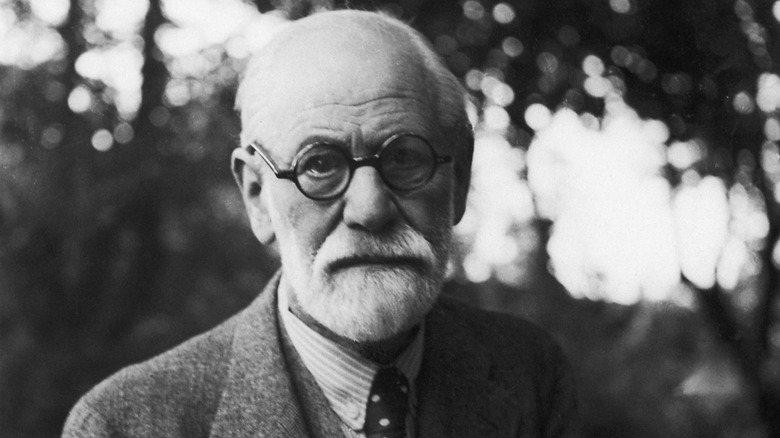The Reason We Eat Eggs With Bacon Traces Back To Sigmund Freud
Ask any American what the most important meal of the day is, and they will surely tell you it's breakfast. We load ourselves up with a hearty bacon, egg, and cheese or the like because we need fuel for the day ahead. This is age-old wisdom, or so it seems, but it turns out that the modern notion of breakfast is a rather recent development. A century ago, Americans generally took breakfast as a light precursor, eating small portions of bread or cereal with a cup of coffee. Starting the day with eggs and bacon was unheard of, except for some hard-laboring farmers. But today, this pairing anchors every breakfast menu in the country, with diner kitchens hustling to make as much bacon as possible during busy morning shifts. Eggs and bacon are the definitive American breakfast, and it's partly thanks to Sigmund Freud.
Freud had a nephew named Edward Bernays, who emigrated from Vienna to New York City as a child. In the 1920s, Bernays established himself as an immensely influential publicist whose work would earn him the nickname "Father of Public Relations." Much of his work was based on the theories of his uncle, specifically Freud's belief that people are not entirely driven by logic and that they are instead motivated mainly by unconscious desires. Bernays transferred this thinking to the field of public relations by assigning ideologies to products. Rather than market a product on its actual function, he would market it on an ideal it could help the consumer attain. This technique would prove highly effective when Bernays teamed up with a major bacon brand.
How Bernays made breakfast the most important meal of the day
In the 1920s, Edward Bernays was approached by the Beech-Nut Packing Company with a major assignment: Boosting bacon sales. Instead of a traditional marketing campaign based on inundating newspapers with advertisements and coupon deals, Bernays decided to do a little psychoanalysis himself and answer the question, "Why do people eat what they eat?" He figured that people's food choices were driven on some level by ideals they hoped to achieve, specifically health and vitality. He also recognized that people are easily influenced by authority figures, and that having an expert speak on a product's behalf might be more convincing than having the company itself speak for their product.
Putting these ideas together, Bernays asked a doctor at the agency he worked for to write a memo stating that eating a hearty breakfast was healthier than eating a light one. Then, Bernays sent the statement to 5,000 doctors, asking them to endorse it, and around 4,500 of them agreed to do so. He collected their signatures and sent the statement to newspapers to be published as if it were a legitimate scientific study. By planting the idea that a hearty breakfast is important, Bernays manufactured a need in American minds — a need that bacon and egg manufacturers swiftly moved in to fulfill. Fast forward just a few decades, and the most popular American breakfast restaurants are built around the pork and poultry industries — and an easy bacon breakfast is a morning go-to in home kitchens across the country.
Freud wasn't a fan of his nephew's work
Edward Bernays and Sigmund Freud had a close relationship, exchanging frequent correspondences, but Freud was skeptical of his nephew's work. Bernays wrote a number of books about using Freud's theories for marketing. But according to The American Psychological Association, when Bernays sent a copy of the book to his uncle, all Freud had to say was, "I have received your book ... As a truly American production it interested me greatly." Freud also resisted his nephew's many efforts to promote his work amongst U.S. consumers.
Now, what about Bernay's impact on the American diet? Well, it probably won't surprise you to learn that his "hearty" breakfast isn't exactly a healthy one, but it actually does have some upsides. Bacon contains high levels of saturated fat, cholesterol, and nitrite, but it's also rich in protein and vitamin B, as well as minerals like iron and potassium. It's definitely an energy source, but all those same nutrients could be obtained through foods with fewer negative health impacts.
Some health professionals recommend starting the day with foods that have a low glycemic index, like oatmeal and yogurt, so that your blood sugar won't spike and crash. In this regard, eggs and recipes that incorporate bacon might actually be a more nutritious choice than other popular breakfast options like pancakes and waffles, which are higher in carbohydrates. Just remember that healthier doesn't necessarily mean healthiest.


